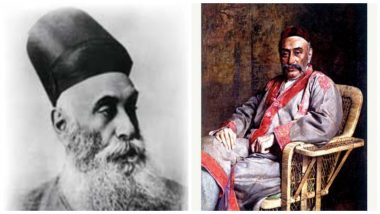"That he was a man of destiny is clear. It would seem, indeed, as if the hour of his birth, his life, his talents, his actions, the chain of events which he set in motion or influenced, and the services he rendered to his country and to his people, were all pre-destined as part of the greater destiny of India." — J. R. D. Tata on Jamsetji
Jamsetji Nusserwanji Tata, the man who placed India on the map of industrial leaders, was born on March 3, 1839. The founder of Tata Group, Jamsetji was born in a Zoroastrian-Parsee family, to Nusserwanji and Jeevanbai Tata in Navsari, Gujarat. He wasn’t just an entrepreneur, but a visionary who had dreamt of making India equipped with facilities of its own. Jamsetji Nusserwanji Tata's 181st Birth Anniversary: Remembering The Father of Indian Industry Who Founded Prestigious Tata Group.
He was known to be a man who did not like public attention or gatherings. His strength was his character. He sought no honour or privilege, his only dream was the advancement of India and the service to people. Like Ratan Tata once said, “He has inspired us with his kindness over the years.”
Jamsetji died on May 19, 1904, at the age of 65. On his 117th death anniversary, we are remembering the pioneer industrialist who left a legacy of kindness and creation behind.
Founder of Tata Group
At the age of 29, Jamsetji founded the Tata Group, one of India’s leading companies, in 1868 as a trading firm. Jamsetji received a formal western education, due to his natural gift in mental arithmetic from a young age. Soon after completing his studies in Mumbai, Jamsetji started contributing to his father’s export-trading business.
During the Revolt of 1857, it was tough to start a new business. However, trade in the opium business was hustling during those times and Nusserwanji, his father, wanted to get into this trade practice. He sent young Jamsetji to China to study the opium trade business. It was here that Jamsetji came across the cotton industry, which was also booming during those times. This influenced his business career and he got into cotton mills.
In 1869, he bought and converted a bankrupt oil mill into a cotton mill, later selling it at a profit after two years. Then, he floated the Central India Spinning, Weaving, and Manufacturing Company in Nagpur. In 1877, he established another cotton mill, ‘Empress Mill’, named after Queen Victoria, the Empress of India in 1877.
Throughout his lifetime, Jamsetji established a number of companies in the textile business.
Father of Indian industry
"While many others worked on loosening the chains of slavery and hastening the march towards the dawn of freedom, Tata dreamed of and worked for life as it was to be fashioned after liberation. Most of the others worked for freedom from a bad life of servitude; Tata worked for freedom for fashioning a better life of economic independence." —Dr Zakir Hussain, the former President of India
Jamsetji Tata had a huge influence on the world of industry, so much so that Jawarharlal Nehru described him as a ‘one-man planning commission’. Nehru described him as one of the big founders of modern India.
He wanted India and its weavers to be known for making clothes of softer and fine quality. For this, he even started experimenting with different ways of cultivating cotton to improve its quality. He was the first person to introduce a ring spindle in his mills, which replaced the throstle used by manufacturers.
Jamsetji not only explored his chances in the cotton and pig iron industry but also ventured into other areas, including hotels, setting the foundation for modern Indian business. Jamsetji had dreamt of setting up an iron and steel company, a world-class learning institution, a unique hotel, and a hydroelectric plant. During his lifetime, only one of these dreams could come true. On December 3, 1903, The Taj Mahal Hotel, popularly known as Hotel Taj today, was inaugurated in Mumbai.
Jamshedpur, a place in Jharkhand has been named after Jamsetji Tata. Much before the city planning had begun, in 1902, Jamsetji wrote to his son, Dorabji, “Be sure to lay wide streets planted with shady trees, every other of a quick-growing variety. Be sure that there is plenty of space for lawns and gardens. Reserve large areas for football, hockey, and parks. Earmark areas for Hindu temples, Mohammedan mosques, and Christian churches."
According to the Tata Central Archives, in February 1912, work for Tata’s Iron and Steel Works began in Sakchi, a small village in Jharkhand. However, when the steel plant opened, people from all over the country came flocking to Sakchi.
On January 2, 1919, Lord Chelmsford, the then Viceroy of India renamed Sakchi as 'Jamshedpur' in respect to Jamsetji Tata. After a couple of weeks, the Government of Bihar and Orissa also renamed the Kalimati railway station as 'Tatanagar'.
Later Life
At the age of 65, Jamsetji’s health began to fail. He was taken to Bad Nauheim, Wetteraukreis, Germany for his treatment, a place often visited by those suffering from ailments of the heart. During his last days, R D Tata joined him in Bad Nauheim. However, Jamsetji urged him to go back and carry forward the work he had started and not let things slide.
On May 19, 1904, Jamsetji left the world while in sleep at Bad Nauheim, Wetteraukreis, Germany. His body was taken to England and on May 24, his remains were buried in the Parsee burial ground in Brookwood Cemetery.
At home, a public meeting was convened in honour of the late Jamsetji by the Sheriff of Bombay.
Following the demise of Jamsetji, Lord Curzon, the then viceroy of India had said, “No Indian of the present generation had done more for the commerce and industry of India."
A commemorative postage stamp in honour of the late industrialist was issued on January 7, 1965 by India Post and a coin on his 175th birth anniversary by the Government of India.
(The above story first appeared on LatestLY on May 19, 2021 08:50 PM IST. For more news and updates on politics, world, sports, entertainment and lifestyle, log on to our website latestly.com).













 Quickly
Quickly





















